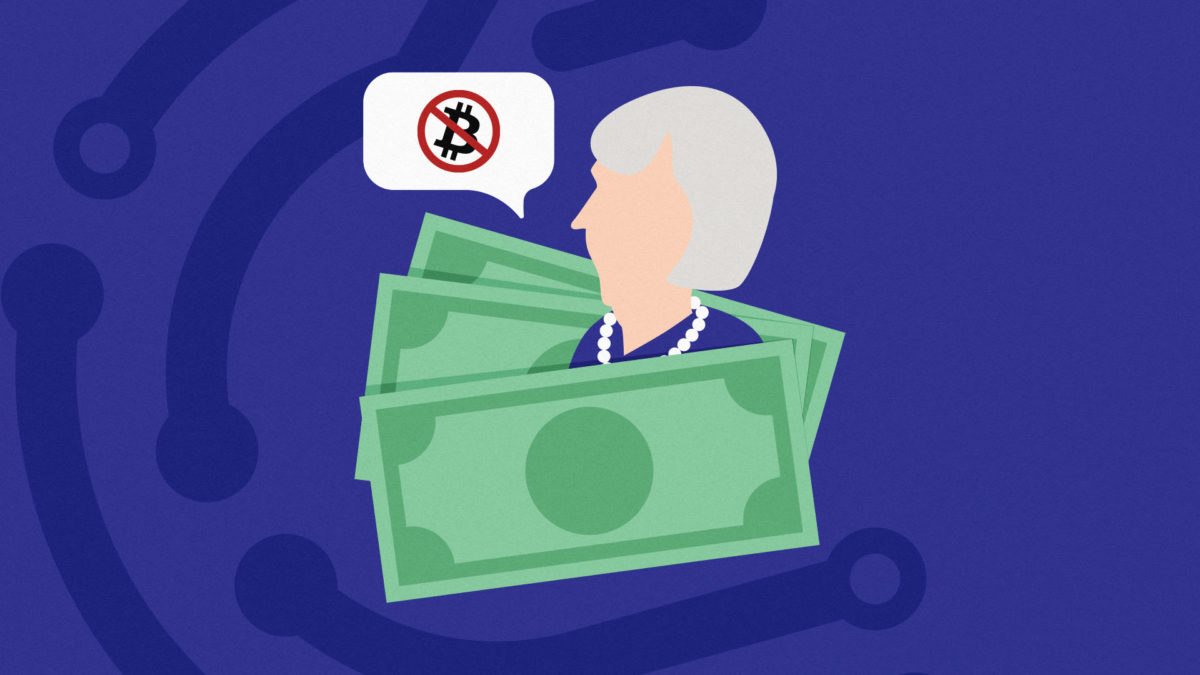Treasury overlord Yellen worried crypto undermines US sanctions, dollar

Treasury Secretary Janet Yellen is concerned that cryptocurrencies like Bitcoin are undermining efforts to protect the global influence of the US dollar with economic sanctions.
In a nine-page “Treasury Sanctions” review released earlier this week, Yellen detailed recommendations to “enhance effectiveness in supporting national security” in a world where cryptocurrencies are ubiquitous.
It cited financial innovation (read: crypto, especially stablecoins), a shifting global economic landscape (read: COVID-19), and geopolitical challenges (read: China) as Yellen’s top three concerns.
“After the September 11, 2001 attacks, economic and financial sanctions became a tool of first resort to address a range of threats to the national security, foreign policy, and economy of the United States,” wrote Yellen in her introduction.
“This tool rests on the formidable strength of, and trust in, the US financial system and currency.”
Yellen oversees more than 100,000 Treasury employees (a workforce 22 times larger than the 4,400-odd employees working for the SEC).
As Secretary, Congress vests in her the power to effectively cut entire countries off from the world’s banking system.
And so, Yellen didn’t mince words in her latest assessment of crypto.
Digital assets allow “malign actors” to maintain and transfer funds outside of traditional finance, she said, and empower the US’ “adversaries seeking to build new financial and payments systems intended to diminish the [US dollar’s] global role.”
Yellen, alphabet soup queen
Yellen is the ultimate leader of government agencies like Internal Revenue Service (IRS), Office of Foreign Asset Control (OFAC), Financial Crimes Enforcement Network (FinCEN), Treasury Executive Office of Asset Forfeiture (TEOAF), Terrorist Financing and Financial Crimes (TFFC) — even the Mint.
Indeed, she is the most powerful person in finance. Her Treasury General Account boasts $134 billion, a largely discretionary fund known as “America’s Checkbook,” that she directs.
Yellen promised in her Senate confirmation hearing that she would increase economic sanctions compliance. Crypto is one of her top priorities.

It’s worth noting that crypto markets are today worth $2.66 trillion — less than 1% of global household wealth ($418 trillion).
But Yellen summarily dismissed crypto in February. Back then, she claimed Bitcoin was an “extremely inefficient” method of financially transacting, and reckoned the industry is mostly used to “launder the profits of online drug traffickers” and “finance terrorism.”
Crypto to skirt sanctions
In a speech at the 2019 Annual International Conference on Counterterrorism, then-Treasury Under Secretary Sigal Mandelker cited the terrorist group Hezbollah’s need for private donations as proof of the efficacy of US sanctions.
Mandelker contrasted Hezbollah’s limited access to crypto-to-fiat offramps with HAMAS’ solicitations of Bitcoin donations. “Without the appropriate strong safeguards cryptocurrencies could become the next frontier,” she warned.
In February this year, the US Department of Justice (DoJ) filed charges against three North Korean programmers for their alleged involvement in the prolific WannaCry ransomware program.
The DoJ alleged the hackers conducted cyberattacks to extort $1.3 billion in cash and cryptocurrencies.
As well, Iran in April reinstated some crypto miners’ ability to legally mine crypto. This was despite concerns about the state of the country’s power grid.
As one of several nations facing US sanctions, Iran formally recognizes Bitcoin mining to avoid US dollar-denominated trade.
Iranian President Ebrahim Raisi, who took office in August, said he was in favor of “outcome-oriented talks” regarding US sanctions.
Iran’s Bitcoin mining industry generated about 3% of Bitcoin’s overall hashrate in August, according to the Cambridge Bitcoin Electricity Consumption Index.
US really loves sanctions
According to charts included in Yellen’s Sanctions Review, Treasury’s use of sanctions has increased 933% since 2000.
Treasury’s sanctions have also shifted to include more countries — all alleged to support terrorism or cyberattacks on US infrastructure.
Yellen and the Treasury call sanctions a “tool of first resort” (contrasting “tool of last resort,” military violence) in addressing national security threats.

Read more: [US dollar superfriends cluck tongues, stroke beards about Tether and Diem]
The report recommended steps to ensure that potential crypto-related sanctions fit well with US interests. Analysis of whether sanctions work well with overall policy goals is required.
“In particular, Treasury should invest in deepening its institutional knowledge and capabilities in the evolving digital assets and services space to support the full sanctions lifecycle of activities,” reads Yellen’s report.
Yellen did however caution against crypto-related sanctions that would sour relations with allied economies. You can find the full document here.
Follow us on Twitter for more informed crypto news.
